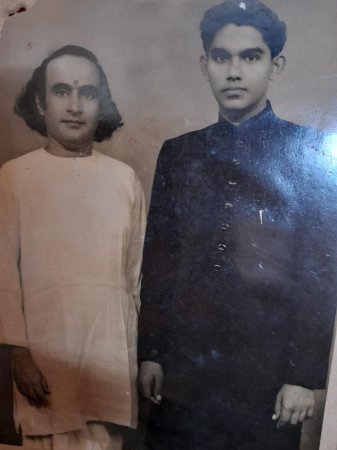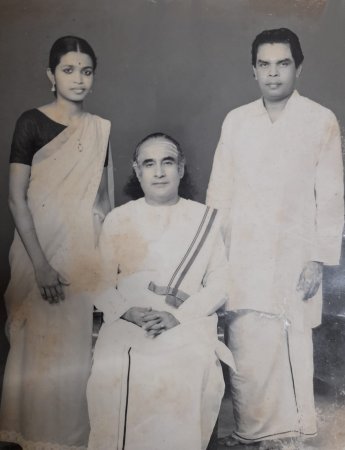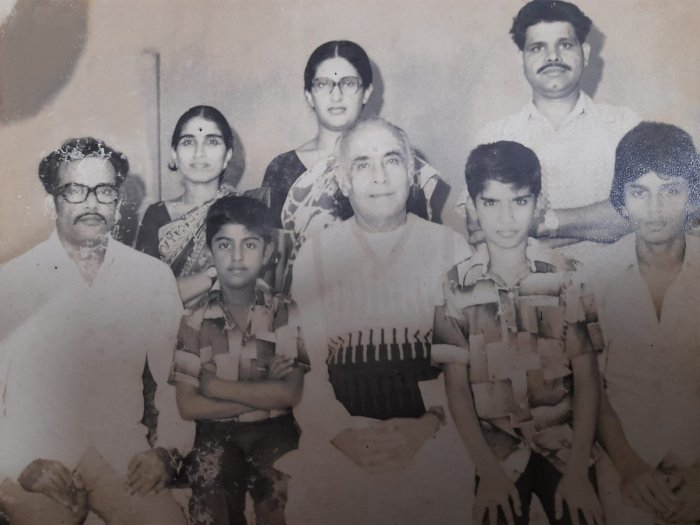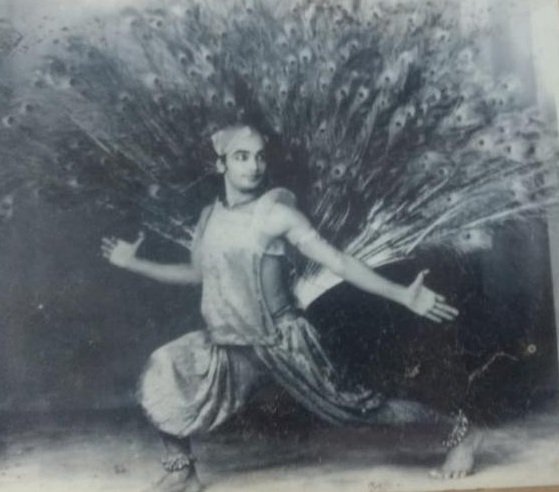
|
 |

|
 |
An imaginary interview with Guru Gopinath - Part 11 - Tapati Chowdhurie e-mail: tapatichow@yahoo.co.in Photos courtesy: Sashimohan May 18, 2022 All parts of the interview The story so far In the previous edition, Guru Gopinath spoke about the memorable incident at a tea-party at Teenmurti Bhavan on the invitation of Pandit Jawaharlal Nehru, when he was in Delhi for the All India Dance Seminar in 1958. He spoke of his meetings with E.M.S. Namboodripad - the communist party Chief Minister of Kerala, who told him about the kind of programs he wished Guru Gopinath to present. He mentioned about the offer made by Sumitra Charat Ram, Secretary of Bharatiya Kala Kendra, New Delhi and Nirmala Joshi, Secretary, Kendriya Sangeet Natak Akademi requesting him to be the Director of Ramayana ballet, which he accepted and for which there were glorious reports in leading newspapers like The Statesman, Hindustan Times and Times of India. Luminaries like Dr. Rajendra Prasad, Dr. Radhakrishnan, Pandit Jawaharlal Nehru, Lal Bahadur Shastri and Indira Gandhi had attended. He summed up this part with reasons for choosing to come back home. The 11th part of the imaginary interview Besides being a dancer, teacher and founder of a popular dance form, you have several publications to your credit. The practical and the theoretical aspects of Indian classical dance; Nritta-Nritya-Natya has been published in six books namely Abhinayankaram; Classical Dance Poses of India; Kathakali dance; Abhinayaprakashika; Natana Kairali; Rhythm and Dance.  Guru Gopinath with Srilankan student Victor Koreiera Between 1981 -1983 you seem to have tutored a record number of students. What was most amazing about it? Name some of your disciples who have made it big. In those 2 years, I was able to teach dance to more than 1500 local and foreign students in Mumbai, Thiruvananthapuram, Madras, Delhi and Ernakulam. I feel greatly satisfied that about 80 percent of those who have learnt under me make a living from this profession. Some have become world famous dancers. Lalitha, Padmini, Ragini, Yamini Krishnamurthy, Padma Subrahmanyam, Chandrasekharan, Keshavdas, Vani, Chellappan, Prof Sankaran Kutty and Venu G are some of the names that come to my mind, at that point of time. I was invited to direct the Shreyas Foundation Kerala Fair in Ahmedabad in 1975 where Leena Mangaldas (Dr. Vikram Sarabhai's sister and the daughter of Ambala Sarabhai) was the director. In two and a half months time, I trained 32 students (both girls and boys) in some classical dances of Kerala, folk dances and Vanjippattu which were performed by them. The fair was inaugurated by the then Governor of Gujarat, K K Vishwanathan. Thereafter, as per the request of the SNDP branch of Ahmedabad, few dancers from there were selected to perform in the dance drama 'Chandalabhikshuni' by Kumaran Ashan directed by him where he played the role of Buddha in this dance drama. For this I was gifted with a golden plate by Sri Vishwanathan. Leena Mangaldas appreciated my work and paid me Rs.1000 more than the allotted amount.  Guru Gopinath with Srilankan student Suppayya and his daughter Santhini (both were his students) How well did you manage your expenses before and after marriage? Till I got married I spent the bulk of my income on the needs of my parents and my siblings. I renovated the house where I was born. After marriage, when I started living in Nartakalayam in Thiruvananthapuram, I constructed a house for my father at Champakkulam with Rs.16,000, because he used to sleep in a small hut. At that time, we had no rights on the land on which I built the house. Some of the locals told me that the house I built would be owned by my father's nephews in future. My answer to that was simple. 'None would take it away during my father's life time. I had built the place only for my father'. Once the construction of the building was completed, I used to visit my father and mother occasionally. I felt great joy in seeing my father look happy. When I asked him what else I could do to make him more comfortable, he said, "Son, I just need to drink chakkara kapi (jaggery coffee ) everyday, I don't need anything more. I would lead a contented life if your life is happy." I always made sure that I gave him sufficient money for him to have coffee everyday without fail. Whenever I asked my mother if she wanted money, her reply would be, "Give me whatever amount you wish to give me." However, she would always insist that I should give something to the other family members as well. After fulfilling my mother's wishes I would happily return home keeping the amount I would need for my journey back. How often did you visit Champakkulam after settling down in Madras? I used to visit Champakkulam only once a year after settling in Madras. When you received the news of the passing away of your father why were you not able you visit Champakkulam immediately for his last rites? When did you finally go to there? I was invited by Mookambika Devaswom Trustee Chairman Manjaya Chetty for a fund raising program for the temple. Along with Thangamani and my team, I reached Mangalapuram for the fund raising program for Mookambika Devi temple. Three hours before the program started, I received a telegram from my elder brother Champakkulam Pachu Pillai that my father had passed away. The telegram had been first sent to Madras, after which it was redirected to Mangalapuram. I sent a telegram back saying that the last rites should be done immediately and I would reach Champakkulam as soon as possible. Though heartbroken, I did the program. Next day, early morning I took a train to Champakkulam. I sent Thangamani and the other team members to Madras. The funeral was over two days before I reached. I stayed back till Sanjayanam and after building a tomb at the place where my father's funeral ceremony was held, I returned home to Madras. I went back to Champakkulam again three days before the 16th day ceremony of my father's last rites. To observe the occasion, all my father's nephews were there too. There was a plan to divide the expenses of the 15th and 16th day among the family members. I proposed that I would like to bear all the expenses for both the days should everyone agree. Everybody agreed. I handed over Rs. 1200 to my elder brother. My elder brother arranged all the necessary things and to my great satisfaction, the ceremony was conducted peacefully. On the 15th day, there were whispers among my nephews with his neighbours about who would get my father's land and the house that I had built for him. One of my father's well-wishing neighbour informed me about it. I said that I was willing to talk about it on the 17th day after all the rites were over. On the 17th day, I spoke to all my father's relatives: "It's my father and your uncle who has passed away. I do not know anything about the legal issues concerning inheritance or the underlying rights connected and I do not intend to investigate it either. I would like to say that you can take my father's 50 acres of land but his children will get the building and the area surrounding the building." They were more than happy with the settlement I made. I returned to Madras on the 18th day. What kind of a man was your father? My father was above 90 when he passed away. He was a very disciplined man. He would wake up every morning and work until lunch and then take an hour's rest. Then his routine of walking, working etc. would start once again and continue again at 7 in the evening. He used to keep a few workers to work on the land and the fields, rest of the work he did it himself. Without much wealth or property, he took care of his 7 children, wife and mother-in-law. I feel that he has suffered a lot from having to deal with the standard of living of a middle class family. But, during his old age too, because of his sheer diligence, he was able to keep his body and soul together. My father believed in the saying, "Sampathu kaalathu thai pathu vachaal aabathu kaalathukku pathu thinnaam" meaning if you plant 10 trees when you have wealth, in difficult times the tree will provide you with fruits. I am a believer of that saying too, because of which I am able to lead a comfortable life today. Tell us about your mother. Ten years after my father's death, my mother also passed away. I was not at home during her death too. But I could be present for her last rites. My mother was a philanthropist and took care of the household while remaining unconcerned about income and expenditure. I remember the arguments and fights my parents had regarding the household expenses. I left the rights of her property to the other family members. What was your family life like? I have already mentioned at one point that my bank balance was just over eleven rupees when I got married to Thangamani. Both of us had made up our minds to save at least Rs.2 if we earned Rs.10. Leading a luxurious life style was not our cup of tea. We lived a life of comfort and contentment with whatever we got.  Guru Gopinath with his nephew's family, daughter Vilasini is in the middle How many children did you have? Thangamani gave birth five times. However our first son lived only for six months. We have one boy and three girls. Since Thangamani and I had very little formal education, we wished to give a good formal education for our children and taught them accordingly. My first daughter Vasanti is a first class, first rank holder in MA Zoology from Bangalore University. Second daughter Vilasini is a first class MA in English. After passing from Women's College, Thiruvananthapuram, she qualified in the Civil Services and was a successful IAS officer. My third daughter Vinodini is a first class, first rank holder in MA Sociology from Kerala University. Our son Venugopal could complete only up to 3rd year in BSc in Agriculture from Coimbatore Agricultural College. He could not complete his degree like my daughters. We as parents have accepted him as he is. During their childhood, Vasanti has acted in two movies, Vilasini in three and Vinodini in fourteen. Vasanti is trained in Indian classical dance forms like Kathakali, Bharatanatyam and Manipuri, Carnatic music and Rabindra Sangeet. Vilasini and Vinodini have also learnt a bit in dance and music. Vasanti is married to Vijay Kumar Jayaswal from North India. They are settled in Los Angeles. They have two sons. Vilasini is married to K Ramachandran, a native of Pattambi. Vilasini is serving as the Surat District Development officer in Gujarat. They have a daughter named Sukanya. Vinodini is married to her classmate Sashimohan. He is from Kozhikode and works as a sub-editor in Mathrubhoomi. Vinodini is not employed. She stays with us. They have a son. Son Venugopal is not employed as such. He looks after household works. He is married to Prasanna from Vazhuthakattu Saraswatimandiram. She works in The State Bank of Travancore. They have a son and a daughter. In general, Thangamani and I were blessed with a happy and contented family life with the blessings of god. Thangamani and I believe that we have been blessed by Mookambika Devi whom we adore and because of our solidarity and hard work and the existing friendship between Thangamani and myself since the age of 16 and 26 respectively, we enjoy a happy family life. Guruji, you have travelled round the globe. Have you been ever tempted to take hard drinks? I have taken alcohol four times in my entire life. In 1932, when Ragini Devi and I landed at the Meerut railway station for a function, the host, a first class magistrate, took us to the railway restaurant and gave us small glasses of liquor as a part of the welcome treat. Ragini Devi signed to me to drink it and I had it. After a while, I felt as if the room where I was and the railway station were both spinning. Finally, I lay my head down on the dining table. I regained consciousness after reaching the residence. The second time I had hard drinks was on the occasion of attending the birthday dinner party of the Maharaja of Nainital. Like Mahakavi Vallathol, this Maharaja was also hard of hearing. I was sitting just opposite to him at the dining table. After wishing him on his birthday, everyone toasted with a glass of beer and started drinking. When I hesitated, Ragini Devi told me, "You can have it, this will not intoxicate you." Maharaja also said, "Piyo" (drink). Accordingly, I took 2 sips of beer. I still remember the smell and taste of it. It smelt like wood dust soaked in water. Though this time I was not intoxicated, I went to sleep soon after dinner. I woke up with a severe headache. The third time was in September 1954, when we went for a program in Leningrad with the cultural group. A glass of wine was placed in front of my seat at the lunch reception given by the Chairman of the Leningrad Corporation to the members of the cultural group. When he raised his glass in a toast, Marakatham Chandrasekhar said to me, "Gopinath, have your drink." I said, "If the honorable chairman drinks one glass of vodka, I can drink one glass of wine." Everyone clapped. Accordingly, he took his vodka and I took my glass of wine, we clinked our glasses and started drinking. I drank a full glass of wine, like I was drinking cumin water / jeera vellam. My understanding was that wine is like grape juice. But after some time, I felt a numbness in my head. I took some food which they served but I could not take my favourite fish curry because both my hands were shaking by then. When I asked the bearer for some fish, he served fish curry into my plate. I struggled a lot to eat the fish curry. With a knife in my right hand and a fork on the left, I held the food properly but it wasn't reaching the desired destination. I could feel my situation was getting worse. Immediately, I whispered to sitarist Ravi Shankar sitting beside me, "Please look after me." I held the table very firmly without making a scene. I was falling down. I fainted for an hour and a half on my seat. Everyone got up after the meal. Ravi Shankar took me to my bed. That evening at 5pm, there was another reception party for the cultural group but I could not be a part of it. Since I was sleeping, no one woke me up. The fourth time I drank was at a dinner party in Georgia, Stalin's birth place. It was a special kind of ceremony. After the toast, a variety of alcoholic beverages were placed on the table and fruits such as apples, grapes etc were spread on the table and everyone's name was written on a beautiful card in English and placed on each chair. Each member checked the names on the cards and sat on their respective chairs. Immediately, a bearer walked slowly through the dinner hall, carrying large-scale illustrated models of food items that they will serve. And behind him, they were bringing the food items. Soup, bread, potatoes, fish, chicken, duck, bird and deer were brought in from which they could be taken as needed. I should not do the blunder as before, hence I took the wine glass to my mouth as the rest of them but had only 2 sips. I had almost all samples of meal that they brought subsequently. Once again I took the wine glass and had 6 drops of it after which when they brought my favourite fish fry, I ate to my heart's content. When they brought more wine, I declined. They left without pouring into my glass. I asked for more fish.  Guru Gopinath in Peacock Dance Why were you averse to hard drinks? When I used to do Kathakali, I have seen multiple times some Kathakali dancers and singers after a program drink and sleep on the benches and floors in bars. After acting as Lord Rama, Dharmaputran, Hanuman and other such veshams in the night, I wondered how could one let go his life of bhakti. I did not like their life style during the day. From an early age, I was convinced that alcohol can only destroy my sanity and shorten my life. For these reasons I was dead against taking hard drinks. But as I said earlier, I have had alcohol only four times in my life. Please tell us about some other interesting events. During the Russian tour, the night after the Tashkent program got over, the groups received a magnificent dinner reception. The dinner that started at 10:30pm ended at 1:30 am. Subsequently, by 3am everyone reached the airport to leave for Moscow. Because of heavy snow, the flight that was supposed to leave at 4am was rescheduled to 7am. We just sat there. Since it was too cold, I covered myself with the overcoat and slept in a chair. After sometime I woke up hearing the sound of Thappumelam (sound of a musical instrument). To keep the groups from getting bored, the people who came to take us on the plane arranged for two young female dancers and an instrument player at the airport. This was a plan to make the members of the cultural group happy. The dancers started dancing in front of us. I watched them for a while. But due to fatigue, heavy dinner and cold, I soon fell asleep. To be continued…..  Tapati Chowdhurie trained under Guru Gopinath in Madras and was briefly with International Centre for Kathakali in New Delhi. Presently, she is a freelance writer on the performing arts. Post your comments Please provide your name and email id when you use the Anonymous / blog profiles to post a comment. All appropriate comments posted with name and email id in the blog will be featured in the site. |